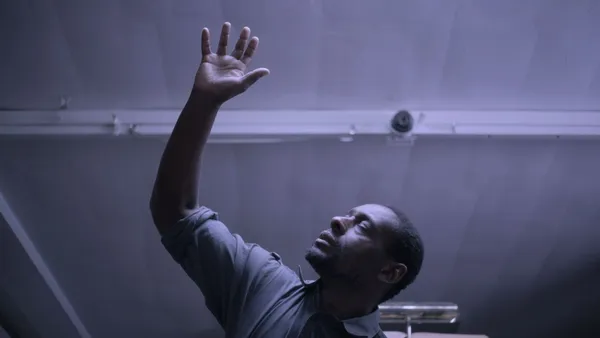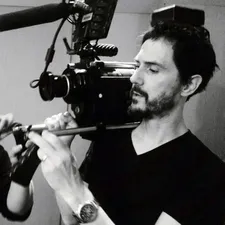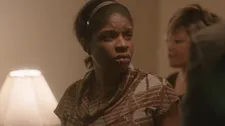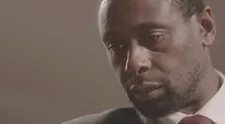 |
| David Harewood as Abe in Free In Deed. Jake Mahaffy: 'I grew up in a religious pentecostal-style environment and then fully de-converted so I’m familiar with the worldview and the language' |
AW: Faith plays a major role in the film. In the case of Melva her 'faith' in God seems to be initially inspired by the fact that her faith in secular institutions has been so badly shaken. How important was it for you to balance this failure of institutions such as doctors/hospitals/police with what leads on to her faith in God also being failed in the most awful way.
 |
| Jake Mahaffy: 'The process of shooting and editing was my attempt to keep the film from being too literal, too obvious, melodramatic, superficial' Photo: Courtesy of Sala Web |
AW: You work with actual churchgoers in your film. How easy was it to get Christians to participate given that while your film is non-judgemental on one level it still shows what can heppen when faith - and people - get pushed to extremes? Did you shoot at actual church services and, if so, what challenges did that present
JM: I grew up in a religious pentecostal-style environment and then fully de-converted so I’m familiar with the worldview and the language. My affinity and communication about the project helped. We’re talking about individuals here, not a faceless mass of Christians. So each person may have their personal, non-religious reasons for participating that I’m not privy to. But I think the rare opportunity to have their faith and belief represented authentically, independent from the larger story, was an attraction for most.
The church-goers I spoke with understand that their prayers aren’t always answered. They understand that thousands more people die from medical malpractice and neglect than faith-based killings each year, but they don’t stop taking pills for their headaches. Being religious is a faith like any other. It’s about having a story that provides one with an identity and place within the chaos of raw experience. Some people have implicit and intractable faith in ‘the system’, the government, the financial order, news media, human progress. These are all just stories.
AW: Although we see people worshipping together at these storefront churches, your camera often shows how they are in isolation rather than acting in unison, can you tell us about this loneliness in a crowd and the emphasis of discordant aspects. You also make interesting editing choices, such as cutting from laughter to much more dark events which emphasise the violence of the moment, did a lot of the shape of the film come together in the edit
 |
| Edwina Findley as Melva. Jake Mahaffy: 'We tried to compose shots for negative space and open frames so that the environment is a character itself, not just a backdrop' |
AW: Abe remains almost as much of an enigma throughout the film as Benny, although there are hints of a dark past, such as when he says, "I don't want to hurt people no more". You based your story on a real life event, how hard was it to do that, how did you go about your research and how difficult was it to cast the roles given that they are both require such committed and distilled performances.
JM: Basing the film on actual events made it much easier, having references to rely on and maintain authenticity. I met with church and family members involved in the incident. I started filming documentary footage but was eventually closed out. With casting, we just had to find the people willing to take the roles. The film could have gone terribly wrong in so many ways, so finding people who would commit despite the risk was the biggest challenge. Then we changed the characters to match the actors in some cases. That’s just part of the creative process.
 |
| David Harewood as Abe in Free In Deed. Jake Mahaffy: 'Basing the film on actual events made it much easier, having references to rely on and maintain authenticity' |
JM: I don’t see this film as a response to any other kind of movie. It is its own thing, made as a self-sufficient experience. Viewers will eventually contextualise the film based on their own stories and worldview but that’s entirely out of my control. I’m not worried about ‘backlash’ or any other kind of reaction. There is no misrepresentation in the film. There are some movie tropes but there is nothing that can be cited as agenda-driven or shortchanging. It is a film about human empathy and consciousness.
AW: This film took you 12 years to develop - will we have to wait as long for the follow up?
JW: I don’t know any better than you. I have plenty of plans, written screenplays and ideas. But I also have a full-time job. And getting the money and time to make another film isn’t dependent on myself alone.
For more information about the film, visit the official site.
























